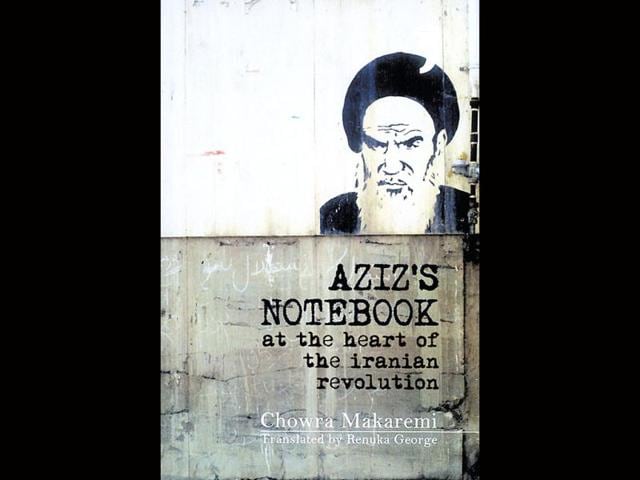Trampling on flowers
This selection from her grandfather Aziz’s notes, that forms a part of Chowra Makaremi’s book, highlights the Kafkaesque nature of 1980s Iran. Unravelling the knots
This selection from her grandfather Aziz’s notes, that forms a part of Chowra Makaremi’s book, highlights the Kafkaesque nature of 1980s Iran.

I turned to Fataneh and said: “My child, what should not have happened, has happened… this martyrdom you courted – you have obtained, but by other means than those you dreamt of. The caravan moves on and we, we only follow… For the moment, the main thing for you… is the baby you are carrying inside you… There is little chance... of them executing both of you before the delivery.”… After handing a sum of money over to Fataneh, we left the Sepah… around the month of August, they contacted us from Gachsaran to announce that Fataneh had been transferred there: “You can come to see her.”…

May no father or mother ever have to endure such a meeting! They had locked the poor, visibly pregnant, woman up in a metal shed, in a temperature of 52°C. When she left the shed she was soaked in sweat, as if she had stepped, fully dressed, out of a tub of water. We were speechless... for two days they paraded our poor Fataneh through the town in a convertible car… They had recruited people to follow the car, chanting: “Fataneh Zarei must be executed!” However, when they saw the hatred this spectacle provoked among the local population, they sent the poor woman back to Bandar-Abbas...
The atmosphere in the prisons had changed. The daily executions had been transformed into group massacres: the young, the old, children or pregnant women, nothing made any difference to them anymore. The main thing was to empty the prisons as there was no room for the new arrivals...
On 7 October 1982, my poor daughter telephoned us: “You don’t feel like coming to Bandar-Abbas?”… “All right, your mother and I will be there tomorrow or the day after.”…
We went to the Sepah where we were told: “Go to the court... she is no longer here; they took her away”. We went to the court, but they told us she was not there either: “Go to the prison in Shahrak, she might be there”... We reached Shahrak at 11 a.m... When the information officer arrived he ran through the list and said: “Your daughter’s name is not on it. Go and sit down until you are called.” …Soon afterwards my name was called. I was happy… I thought: “They must have brought her here”. Yes, they had brought her here, but how!...
After a body search, I finally go in and I am directed towards a room. There, right in the middle, is Fataneh’s bag. Suddenly I start, my eyes cloud over, then I realise that a sister is sitting on a chair in a corner, clutching her tightly-wrapped veil… this woman is holding my child’s watch and wedding ring in her hand… Chilled and stunned, I remain standing in the middle of the room like a lifeless statue, my tongue dry. Just then a brother, or should I say an executioner, enters and holds out a piece of paper on which a few words are written.
He says: “Sign”.
“What is it? What happened?”
“I do not know the how or the why of this story. It is a letter we received, and here is the bag, the watch and the ring. If you sign, we will return them; otherwise you will have to go to the court and ask for an explanation.”
I signed and recovered the possessions. Fataneh’s mother and mother-in-law were waiting outside: as soon as they caught sight of me from a distance, they began to beat their heads... We found a car immediately and went to the court. The Bandar-Abbas court was located at the centre of the main town square. My daughter’s mother-in-law shouted at the top of her voice:
“Unbelievers! You criminals who call yourselves Muslims! You killed my twelve-year old son; you killed my twenty-six year old son; you killed my daughter-in-law. What have you done with my eight-month old grandchild?”... It was heartbreaking; everyone fled...
We took my child’s bloody body out of the drawer in the morgue. The sight left me gaping. “My God”, I said to myself, “is this Fataneh, lying here, or is it an angel instead, with a thinner body, a radiant face, smiling lips, expressing the peace of her soul and saying, in her silent language: ‘Do not grieve for me, I have been released, I have attained the freedom I was waiting for, counting the minutes’”...
The morgue official and the ambulance driver, who were also amazed, said: “ ...We have seen a lot of dead people, martyrs from the front [of the war against Iraq] … Their faces were never as radiant as those of the young mujahedin whom they execute.”…
Despite her mother and her mother-in-law’s repeated requests to be allowed to enter the preparation room so that they could see their child for the last time, the officials refused... Her mother’s main concern was to discover whether her daughter had been killed while she was still pregnant, or if they had aborted or delivered the baby by some means beforehand... Unfortunately, she was unable to see her daughter for the last time.
Finally, at 5 p.m., on 18 October 1982… three people… buried the fruit of
their life beside her husband who had been cut down prematurely, and
the hundreds of other young people, flowers stripped of their petals and trampled.
Read the unedited chapter at www.hindustantimes.com/Aziz



